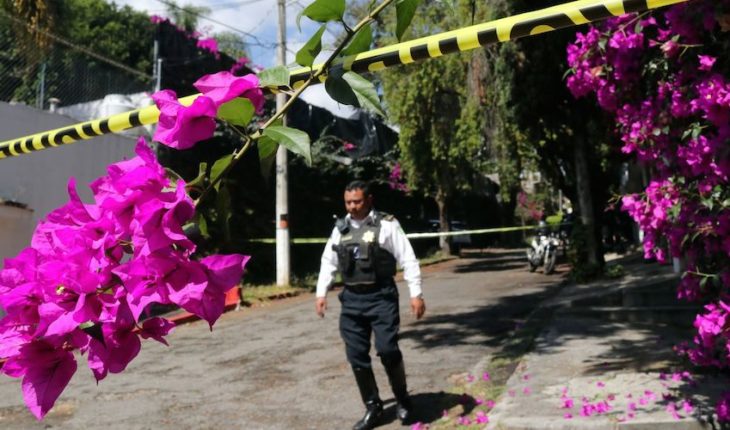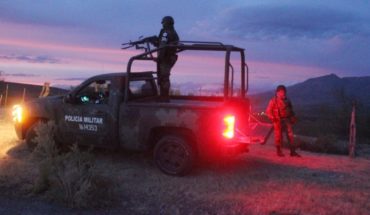In the last year, security has been affected in 19 states: the homicide rate has increased, the incidence of crime prevailed and citizens’ perceptions of the matter deteriorated.
The strengthening of the rule of law continues to be a pending issue in the country, where situations of violence, corruption and impunity affect millions of Mexicans.
According to the State of Law Index 2019-2020, prepared by the World Justice Project (WJP), the most affected security entities were Morelos, Baja California, State of Mexico, Guanajuato and Mexico City.
Read more: With 35,588 murders, 2019 is the most violent year on record
Although insecureness increased in 19 states, WJP noted that the homicide rate declined in 14 states, crime prevalence and incidence dropped by 13 and security perception increased by 18.
The index measured the situation of the country’s 32 states in the rule of law: whether there were limits to government power, lack of corruption, open government, fundamental rights, order and security, and was carried out on the basis of the opinion of more than 25 thousand citizens and 2,600 specialists, who were surveyed.
The results show persistent challenges across the country in terms of corruption and justice, mainly in Guerrero, Puebla, Quintana Roo, Morelos, Mexico City and the State of Mexico.
Find out: Tijuana, Juarez and Acapulco, the municipalities with the most homicides in 2019, together add up to more than 3,000 cases
Human rights
Regarding the perception of the effective protection of human rights, the index found that the worst-rated entities were Guerrero, Veracruz, Puebla, Chiapas and Quintana Roo.
Yucatan, Nuevo León, Baja California, Aguascalientes and Querétaro had the highest scores, in which citizens perceived the greatest absence of discrimination, that due legal process is guaranteed by people accused of crimes and that the rights to life, security and freedom of expression are respected.
Corruption
The index notes that citizens perceived the existence of bribes, undue influence suffered in the government and the diversion of public resources to a greater extent in Mexico City, Chiapas, Guerrero, State of Mexico and Jalisco.
Querétaro, Zacatecas, Guanajuato, Aguascalientes and Colima were the best qualified in the absence of corruption.
Weights and counterweights
Veracruz, Quintana Roo, Puebla, Guerrero and Chiapas were the entities where the weights and counterweights that limit the actions of those who govern, in particular governors, mayors and other authorities of the states, were worst evaluated.
Nuevo León, Baja California, Colima, Yucatán, Zacatecas and Aguascalientes were the entities with the highest score in measuring the independence of powers, the participation of civil society and the press as counterweights, as well as the sanctioning of officials who abuse their functions or do not comply with the normative.
Transparency
The states in which the government is accountable and shares information with greater opacity were Querétaro, Tlaxcala, Nayarit and Tamaulipas.
In Mexico City, Guanajuato, Jalisco, State of Mexico and Zacatecas, citizens noted that they can know the government’s action through access to public information, which favored the impact on their decisions.
Law enforcement
As for the effective application of the law in matters such as public health, workplace safety, environmental protection and commercial activities, the worst evaluated were Tabasco, Chiapas, Mexico City, Sonora and Morelos.
Citizens and specialists rated Querétaro, Guanajuato, Baja California, Campeche and Aguascalientes as the states where regulations are most effectively enforced, with less corruption in the application of regulations and the state government does not illegally expropriate property.
Civil justice
This indicator measured whether people accessed peaceful and effective dispute resolution mechanisms through the civil justice system.
According to the World Justice Project, ensuring access to civil justice requires people to know and rely on formal mechanisms to resolve their legal problems.
Guerrero, Chiapas, Jalisco, Veracruz and Tlaxcala were the entities that received the lowest civilian justice scores.
The best evaluated were Guanajuato, Nuevo León, Durango, Aguascalientes and Campeche, in them, it was considered that people can solve their legal problems more easily and without high costs or bureaucratic processes.
Criminal justice
The quality of the criminal justice system was another aspect assessed. The states best qualified in respect for the rights of victims and accused persons were Guerrero, Mexico City, Puebla, Veracruz and the State of Mexico.
Querétaro, Zacatecas, Sinaloa, Guanajuato and Aguascalientes had a higher score in terms of perceptions about the effective actions of police and public ministries, as well as the systems of procurement and the provision of justice.
WJP’s investigation revealed that the rule of law advanced in the past year in 15 states, dropped by 11 and remained unchanged in six.
Mexico faces major institutional challenges, so it considers it necessary to advance public partnerships and policies that strengthen public institutions and ensure law enforcement, he concluded.
What we do in Animal Político requires professional journalists, teamwork, dialogue with readers and something very important: independence. You can help us keep going. Be part of the team.
Subscribe to Animal Politician, receive benefits and support free journalism.#YoSoyAnimal
translated from Spanish: 19 states worsened to ensure security in 2019
February 13, 2020 |





